![Captain Kidd [1945]](/pictures/1002294.jpg) Captain Kidd | DVD | (25/08/2003)
from £N/A
| Saving you £N/A (N/A%)
| RRP
Captain Kidd | DVD | (25/08/2003)
from £N/A
| Saving you £N/A (N/A%)
| RRP The exhilaratingly unhistorical adventures of pirate Captain Kidd revolving around treasure and treachery!
![Modern Times - Dual Format Edition [Blu-ray] [1936]](/pictures/1101723.jpg) Modern Times - Dual Format Edition | Blu Ray | (23/08/2010)
from £22.99
| Saving you £-3.00 (-15.00%)
| RRP
Modern Times - Dual Format Edition | Blu Ray | (23/08/2010)
from £22.99
| Saving you £-3.00 (-15.00%)
| RRP In Modern Times one of Charles Chaplin's most popular films The Tramp struggles to live in a modern industrial society with the help of a young homeless woman. This Dual Format Edition (Blu-ray and DVD) includes the 1936 feature which has now been restored in high definition.
 Mary Martin & Ethel Merman - the Ford 50th Anniversary Show | DVD | (01/11/2004)
from £18.97
| Saving you £-0.98 (N/A%)
| RRP
Mary Martin & Ethel Merman - the Ford 50th Anniversary Show | DVD | (01/11/2004)
from £18.97
| Saving you £-0.98 (N/A%)
| RRP Mary Martin And Ethel Merman - The Ford 50th Anniversary Sho
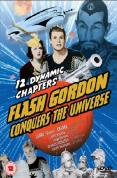 Flash Gordon - Conquers the Universe | DVD | (16/05/2005)
from £N/A
| Saving you £N/A (N/A%)
| RRP
Flash Gordon - Conquers the Universe | DVD | (16/05/2005)
from £N/A
| Saving you £N/A (N/A%)
| RRP A mysterious plague the Purple Death ravages the earth. Dr. Zarkov investigating in his spaceship finds a ship from planet Mongo seeding the atmosphere with dust. Sure enough Ming the Merciless is up to his old tricks. So it's back to Mongo for Flash Dale and Zarkov this time with ready-made allies waiting: Prince Barin of Arboria and Queen Fria of the frozen northern land of Frigia; where it so happens is found polarite antidote to the plague. But Ming will use all his for
![Charlie Chaplin Marathon - Vol. 2 - A Dog's Life / The Kid / Behind The Screen [1918]](/pictures/1013181.jpg) Charlie Chaplin Marathon - Vol. 2 - A Dog's Life / The Kid / Behind The Screen | DVD | (09/02/2001)
from £N/A
| Saving you £N/A (N/A%)
| RRP
Charlie Chaplin Marathon - Vol. 2 - A Dog's Life / The Kid / Behind The Screen | DVD | (09/02/2001)
from £N/A
| Saving you £N/A (N/A%)
| RRP Featuring 'A Dogs Life' and 'The Kid' and 'Behind The Screen'.
![Love And Bullets [1979]](/pictures/1002373.jpg) Love And Bullets | DVD | (28/07/2003)
from £N/A
| Saving you £N/A (N/A%)
| RRP
Love And Bullets | DVD | (28/07/2003)
from £N/A
| Saving you £N/A (N/A%)
| RRP A tough American Detective is sent to the Swiss Alps to bring back the girlfriend of a powerful gangster so that she can testify against him. The Crooks will do anything they can to stop her..
![A Life At Stake (1955) [Special Edition] [Blu-ray]](/pictures/1156878.jpg) A Life At Stake (1955) | Blu Ray | (07/09/2021)
from £N/A
| Saving you £N/A (N/A%)
| RRP
A Life At Stake (1955) | Blu Ray | (07/09/2021)
from £N/A
| Saving you £N/A (N/A%)
| RRP  Colonel Effingham's Raid | DVD | (01/09/2003)
from £10.99
| Saving you £-7.00 (N/A%)
| RRP
Colonel Effingham's Raid | DVD | (01/09/2003)
from £10.99
| Saving you £-7.00 (N/A%)
| RRP ![The General [1927]](/pictures/1013338.jpg) The General | DVD | (22/10/1999)
from £N/A
| Saving you £N/A (N/A%)
| RRP
The General | DVD | (22/10/1999)
from £N/A
| Saving you £N/A (N/A%)
| RRP Buster Keaton's career reached its creative apex with this rousing comic adventure. Not merely one of the finest silent films, this remains one of the great film comedies of all time. The Great Stone Face stars as Southern railroad engineer Johnny Gray, a man with only two loves: the sweet Annabelle Lee (Marion Mack) and his trustworthy engine, the eponymous General. When Fort Sumner is fired upon he is one of the first to enlist, but when the war office rejects him (he's too valuable as a trained engineer) his sweetie rejects him as a coward. Johnny has the opportunity to prove his bravery when Yankee spies steal his engine and inadvertently kidnap Annabelle, and Johnny pursues with all the resources at his disposal: handcar, bicycle and finally railroad engine. Keaton's love/hate relationship with technology and machinery shines as he becomes one with his beloved locomotive and wrestles with a finicky cannon that threatens to blow his engine off the tracks; with tremendous dexterity, he nails the humour with inimitably deadpan takes. Spunky Marion Mack makes a perfect partner for Keaton, not merely a foil but a gifted comedienne in her own right. Other Keaton films contain more laughs and inspired comic stunts, but none combines romance, adventure and comedy into a solid story as seamlessly as this silent masterpiece. --Sean Axmaker, Amazon.com
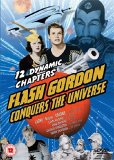 Flash Gordon Conquers The Universe | DVD | (16/05/2005)
from £N/A
| Saving you £N/A (N/A%)
| RRP
Flash Gordon Conquers The Universe | DVD | (16/05/2005)
from £N/A
| Saving you £N/A (N/A%)
| RRP 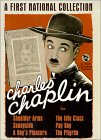 Charles Chaplin: A First National Collection | DVD | (14/03/2000)
from £N/A
| Saving you £N/A (N/A%)
| RRP
Charles Chaplin: A First National Collection | DVD | (14/03/2000)
from £N/A
| Saving you £N/A (N/A%)
| RRP ![Charlie Chaplin - Gold Rush [1925]](/pictures/1012277.jpg) Charlie Chaplin - Gold Rush | DVD | (22/09/2003)
from £N/A
| Saving you £N/A (N/A%)
| RRP
Charlie Chaplin - Gold Rush | DVD | (22/09/2003)
from £N/A
| Saving you £N/A (N/A%)
| RRP Chaplin's personal favourite among his own films, The Gold Rush embodies all the trademarks of his mix of slapstick, satire, social commentary and sentiment--a perfect showcase for his ever-popular Little Tramp. Set during the Klondike Gold Rush in 1898, the film features a comic reworking of the gruesome Donner Party story, where a group of snowbound immigrants resorted to eating their clothes and then each other to stay alive. It opens with a grand shot of gold prospectors snaking up the side of a mountain. We then see the Tramp, typically estranged from the rest of the group, making his own way across the snow. Seeking shelter in a blizzard, he finds the cabin of the dangerous criminal Black Larson (Tom Murray) and when another prospector, Big Jim McKay (Mack Swain), comes along, the two of them take charge of the cabin and eventually drive him out. Starving on Thanksgiving, the pair decide to dine in style when the Tramp cooks one of his shoes, famously acting as if he's cooking a fine piece of meat; twirling the laces up like spaghetti and savouring every last nibble. When he finally escapes, the Tramp ends up in a local town and falls in love, only to be rebuffed on New Year's Eve. When a chance meeting reunites him with Big Jim, the two go back in search of gold hidden near the cabin. Despite its unlikely origins, the story is shaped into a classic comedy containing many famous set-pieces, including the cabin teetering on the edge of a cliff and the Tramp morphing into a chicken before the starving Big Jim. Ultimately it's Chaplin's endearing and amusing persona that makes this material genuinely enduring. On the DVD The Gold Rush comes to DVD in a decent transfer with good mono sound and the option of Dolby Digital 5.1. The second disc of bonus features opens with an introduction by David Robinson, who chronicles Chaplin's work on the film, which was interrupted when his clandestine affair with his 15-year-old leading lady meant that, due to her becoming pregnant, the filming had to close for a few months while a new female lead was found. The original 1925 version of the film, before Chaplin updated it with the addition of sound in 1942, appears in full. The Chaplin Today documentary illustrates the influence of the film on director Idrissa Ouedraogo from Burkina Faso, whose own work follows similar themes, as well as going behind the scenes on the original production. Trailers, posters and stills round off this worthy addition to the Chaplin Collection. --Laura Bushell
![Charlie Chaplin - Modern Times [1936]](/pictures/1012282.jpg) Charlie Chaplin - Modern Times | DVD | (01/06/2006)
from £N/A
| Saving you £N/A (N/A%)
| RRP
Charlie Chaplin - Modern Times | DVD | (01/06/2006)
from £N/A
| Saving you £N/A (N/A%)
| RRP Modern Times marks the last proper appearance of Charles Chaplin's iconic Little Tramp, and finds our hero struggling to make ends meet in the Depression of the 1930s. Along the way he takes up with a juvenile delinquent (actually 24-year-old Paulette Goddard) and plays a prison incident with "nose powder" for drug-induced laughs--both plot elements seeming quite innocent here, though both would provoke controversy today. Modern Times' most famous sequences portray the dehumanisation of factory labour to fine comic effect, balancing satire with slapstick to perfection in several superbly executed set-pieces. While the film has sound-effects and musical score, speech is only presented through mechanical means, via a gramophone, or through wall-sized TVs far more futuristic than in those in HG Wells' Things to Come (also 1936)--it's an interesting footnote that the comic and the SF visionary were friends. Chaplin famously not being a fan of sound cinema acknowledges the need to move with the times, yet hilariously spoofs the exploitation of man and machine while doing so. Amid some great laughs, the political message comes though clearly: the boss is making a fortune while doing jigsaw puzzles in his luxury office, the workers are toiling ever harder on the production line for their pittance. On the DVD: Modern Times is offered in the original 4:3 black and white with good mono sound evidencing just a little distortion and a very clean, clear picture with minimal grain to give away its age. Also included are French and Italian dubbed versions and a pointless and ineffective English Dolby Digital 5.1 version of the soundtrack. The disc features multiple subtitle options, including English for hard of hearing. Disc Two begins with a six-minute introduction by David Robinson. Next comes a very worthwhile 26-minute documentary by Philippe Truffault, Chaplin Today, centred around a perceptive subtitled discussion between French filmmakers Luc & Jean-Pierre Dardenne. There are three trailers, beautifully reproduced posters, an eight-part photo gallery and one entertaining deleted scene, as well as Chaplin's "nonsense song" from the film in isolated form and in a "Karaoke" version. The Documents section begins with a silent 42-minute 1931 documentary/propaganda film, In the Machine Age made by the US Dept of Labor. Along similar but more entertaining lines is Symphony in F a 1940 colour film combining music, manufacturing footage and animation celebrating the Ford motor company, while also included is a sequence from the Liberace Show (1956) with the star performing the vocal version of "Smile", the theme from Modern Times. Demonstrating the truly universal appeal of Chaplin is a 1967 short For the First Time, documenting what happens when the people of the remote Baracoa mountains in Cuba see their first ever movie, Modern Times. This is a remarkable collection which does a great film justice. --Gary S Dalkin
![Charlie Chaplin - Modern Times [1936]](/pictures/1012153.jpg) Charlie Chaplin - Modern Times | DVD | (17/11/2003)
from £N/A
| Saving you £N/A (N/A%)
| RRP
Charlie Chaplin - Modern Times | DVD | (17/11/2003)
from £N/A
| Saving you £N/A (N/A%)
| RRP Chaplin's last 'silent' film filled with sound effects was made when everyone else was making talkies. Charlie turns against modern society the machine age (the use of sound in films?) and progress. Firstly we see him frantically trying to keep up with a production line tightening bolts. He is selected for an experiment with an automatic feeding machine but various mishaps leads his boss to believe he has gone mad and Charlie is sent to a mental hospital... When he gets out he is mistaken for a communist while waving a red flag sent to jail foils a jailbreak and is let out again. We follow Charlie through many more escapades before the film is out.
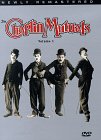 Chaplin Mutuals, Vol. 1 | DVD | (19/11/1997)
from £N/A
| Saving you £N/A (N/A%)
| RRP
Chaplin Mutuals, Vol. 1 | DVD | (19/11/1997)
from £N/A
| Saving you £N/A (N/A%)
| RRP 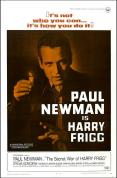 Secret War of Harry Frigg, the | DVD | (26/01/2009)
from £N/A
| Saving you £N/A (N/A%)
| RRP
Secret War of Harry Frigg, the | DVD | (26/01/2009)
from £N/A
| Saving you £N/A (N/A%)
| RRP Harry Frigg is a classic Paul Newman rebel - a private in the U.S. Army who is forever escaping from military prisons. Several Brigadier Generals from the Allied forces are unexpectedly taken prisoner by the Italians while in the shower - a public relations disaster. This is compounded by the fact that the Generals are being held inan Italian Villa and are unable to escape because being all of the same rank none is in command and they are forced to plan by committee with predictably ineffective results. Headquarters devises a plot to free these generals by sending in jail escape expert Harry Frigg...
![Brain From Planet Arous, The / Teenage Monster / Space Cadet [1958]](/pictures/1012800.jpg) Brain From Planet Arous, The / Teenage Monster / Space Cadet | DVD | (01/09/2003)
from £N/A
| Saving you £N/A (N/A%)
| RRP
Brain From Planet Arous, The / Teenage Monster / Space Cadet | DVD | (01/09/2003)
from £N/A
| Saving you £N/A (N/A%)
| RRP You have to credit the folks who put this double bill together. The Brain from Planet Arous, a low-budget alien invasion 1958 film, is one of those programmes that lingers in the memory as much for its title and impressively ludicrous giant-staring-transparent-brain monster as for its poverty row dramatics, in which the usually stiff John Agar grins evilly and flashes contact lenses when possessed by the creature and a good guy brain shows up to take over his dog to thwart the renegade cerebrum's plan for world domination. For this release, Brain is teamed with its original co-feature, a movie so bad you wouldn't buy it on its own but whose presence here is a pleasing extra. Whereas Brain from Planet Arous delivers exactly what its title promises, Teenage Monster is a cheat: rather than feature a mutant 1950s delinquent in a leather jacket, it's a melodramatic Western in which prospector's widow Anne Gwynne keeps her hulking caveman-like son (who seems to be well into middle-age) hidden, only for a scheming waitress to use the goon in her murder schemes. Brain is snappily directed, even when staging disasters well beyond its budget, while Teenage Monster drags and chatters and moans until its flat finale. On the DVD: The Brain from Planet Arous/Teenage Monster double bill disc is a solid showing for such marginal items, featuring not only the trailers for these attractions but a clutch of other 1950s sci-fi pictures (Phantom from Space, Invaders from Mars, etc.) and a bonus episode ("The Runaway Asteroid") from a studio-bound, live-broadcast juvenile space opera of the early 50s (Tom Corbett, Space Cadet) in which hysterical types in a capsule break off from the space programme to deliver ringing endorsements of gruesome-looking breakfast foods. --Kim Newman
 Buster Keaton - Vol. 8 | DVD | (16/05/2005)
from £N/A
| Saving you £N/A (N/A%)
| RRP
Buster Keaton - Vol. 8 | DVD | (16/05/2005)
from £N/A
| Saving you £N/A (N/A%)
| RRP The GeneralBased on a true incident in the American Civil War Keaton plays an engineer determined to recapture his stolen locomotive 'The General' and his girl friend captured by Union soldiers. Often voted one of the best films ever made and said to be Keaton's own favourite this beautifully crafted film has solid scripting meticulous attention to detail magnificent battle scenes and ingenious stunt work.The Electric HouseIn this classic short Buster turns an o
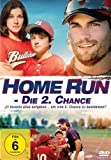 Home Run (DVD) | DVD | (27/03/2014)
from £N/A
| Saving you £N/A (N/A%)
| RRP
Home Run (DVD) | DVD | (27/03/2014)
from £N/A
| Saving you £N/A (N/A%)
| RRP 
Please wait. Loading...
This site uses cookies.
More details in our privacy policy